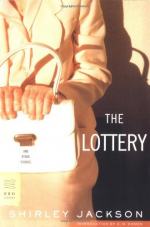|
This section contains 4,898 words (approx. 17 pages at 300 words per page) |

|
SOURCE: “A Marxist/Feminist Reading of Shirley Jackson's ‘The Lottery,’” in New Orleans Review, Vol. 12, No. 1, Spring, 1985, pp. 27-32.
In the following essay, Kosenko argues that the tradition of the lottery represents the inequitable stratification of the social order along lines of gender and economic position.
In her critical biography of Shirley Jackson, Lenemaja Friedman notes that when Jackson's story “The Lottery” was published in the June 28, 1948 issue of the New Yorker it received a response that “no New Yorker story had ever received”: hundreds of letters poured in that were characterized by “bewilderment, speculation, and old-fashioned abuse.”1 It is not hard to account for this response: Jackson's story portrays an “average” New England village with “average” citizens engaged in a deadly rite, the annual selection of a sacrificial victim by means of a public lottery, and does so quite deviously: not until well along in the story...
|
This section contains 4,898 words (approx. 17 pages at 300 words per page) |

|


